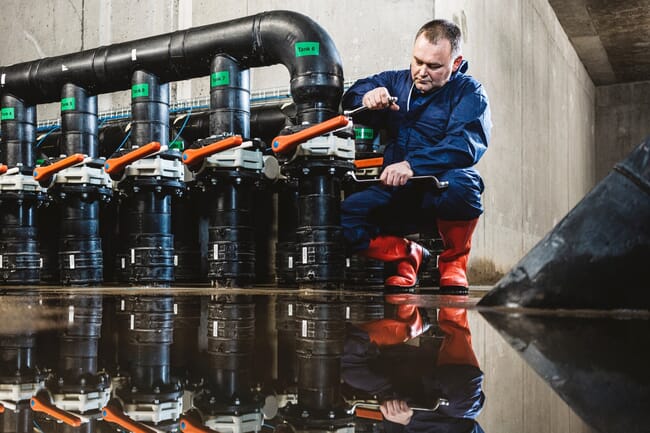
© SSF
The VIBES Scottish Environment Business Award went to Scottish Sea Farms’ for its efforts to capture fish waste – mainly faeces and uneaten feed – from its new £58 million salmon hatchery at Barcaldine, near Oban, and recycle it as agricultural fertiliser.
Lead engineer for the hatchery, Ewen Leslie, explained: “Using technology by Norwegian engineering company Scanship AS, we first aerate the waste to prevent any unwanted bacteria from germinating, then we bind it together into larger particles via the addition of a cationic polymer. That done, the waste is filtered to separate the solids from the water. These solids, which are now of a sludge-like consistency, are then collected in a storage tank.”
Invergordon-based waste management company Rock Highland ensures the sludge is both safe and suitable for agricultural land.
Once the sludge has been certified as being safe for use on agricultural land, the nutrient-rich by-product is then uplifted by tractor and barrel for use on farmland.
Rock Highland divisional director, Neil Barker, said: “We first started out by working with one or two of Scotland’s whisky distillers, helping recycle nutrient-bearing effluent originating from barley into fertiliser.
“Over 15 years later, we’re now working with distilleries from the Orkney Islands all the way down to the Central Belt, spreading around 175,000 tonnes of distillery effluent per annum back to the land via a network of registered landbanks across the whole of Scotland.
“Recent years have seen us diversify and apply the same sustainable service to Scotland’s salmon farmers, with our proven model now collecting sludge from most of the salmon hatcheries across the Highlands and islands of Scotland.”
Scottish Sea Farms’ freshwater team are now developing phase two of their fish waste recycling plans, with the goal of removing the remaining water content and converting the sludge into dry pellets.
“The benefit to the environment of moving from wet to dry form longer-term would be a reduction in the volume of waste material, thereby reducing the number of tankers and road miles required to transport it from hatchery to farmland,” said Leslie.
“For land farmers, dry form would provide an even more nutritional and valuable natural fertiliser alternative that’s easy to handle.”




